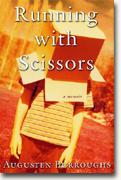
Running With Scissors by Augusten Burroughs.
The first book in a seemingly autobiographical series detailing the odd and dysfunctional (to say the least) journey of a young teenager. While not as funny as its sequel (April's Recommended Reading), the characters are indelibly illustrated and fascinating to watch as they travel through the sometime-carnival, sometime-asylum that is their lives.
"[The doctor] believed that anger was the crux of mental illness. He believed that anger, unless it was expressed freely, would destroy a person. This explained the constant fighting in the house. [His] children had been encouraged not just to sing, dance and jump rope but also to vent.
Anger was like the ground hamburger of [their] existence. Its versatility was inspiring. There was Anger Turned Inward, Repressed Anger, Misguided Anger. There were Acts Made in Anger, Things Said in Anger and people who might very well die if they didn't Face Their Anger.
[The doctor's family] screamed at each other constantly. It was like a competition and the prize was mental health. Every so often [the doctor] would say, "[My daughter] has been expressing a lot of healthy anger lately. I truly believe she's moved up to the next level in the stages of her emotional development...." So then everybody hated [her] because she walked around being so smug and emotionally mature."